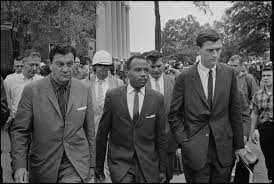On September 20, 1962, one of the most significant events in the civil rights movement occurred when James Meredith was barred from entering the University of Mississippi. This incident, which unfolded against the backdrop of racial segregation and discrimination, highlighted the ongoing struggle for equal rights and access to education for African Americans in the United States. James Meredith, an African American man from Mississippi, had applied to the University of Mississippi with the goal of becoming the first black student to attend the institution. His application was met with fierce opposition from state officials and segregationist groups who were determined to maintain the racial status quo. Despite facing numerous legal challenges and resistance, Meredith persisted in his pursuit of admission to the university. His case eventually reached the United States Supreme Court, which ruled in his favor, stating that the university must admit him based on his qualifications and in compliance with the law. However, when the day came for Meredith to enroll at the University of Mississippi, he was met with a hostile reception. Mississippi Governor Ross Barnett, a staunch segregationist, publicly defied the court's ruling and declared that he would not allow Meredith to attend the university. Governor Barnett mobilized state authorities and deployed the Mississippi National Guard to physically block Meredith's entrance to the university. The campus became a scene of unrest and tension, as protesters and supporters of segregation clashed with federal marshals and civil rights activists who stood in solidarity with Meredith. The standoff continued for several days, with violent confrontations and escalating tensions. The federal government, under President John F. Kennedy, was compelled to intervene to enforce the court's ruling and protect Meredith's rights. Ultimately, after a series of negotiations and federal intervention, Meredith was able to enroll at the University of Mississippi on October 1, 1962, marking a significant victory for the civil rights movement. The events surrounding James Meredith's barred entry to the University of Mississippi on September 20, 1962, had far-reaching implications. It exposed the deep-seated racism and resistance to desegregation within the United States, particularly in the South. The incident drew national attention and prompted a renewed focus on the fight for equal rights and an end to racial discrimination. Meredith's enrollment at the University of Mississippi was a pivotal moment in the struggle for civil rights. It challenged the notion of separate but equal education and paved the way for greater opportunities for African Americans to pursue higher education in previously segregated institutions. The legacy of James Meredith's fight for admission to the University of Mississippi continues to resonate today. His courage and determination in the face of adversity serve as an inspiration for those who continue to advocate for equal rights and access to education. The events of September 20, 1962, serve as a reminder of the progress that has been made in the fight against racism and discrimination, while also highlighting the ongoing work that remains to be done to achieve true equality for all.
